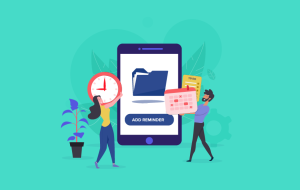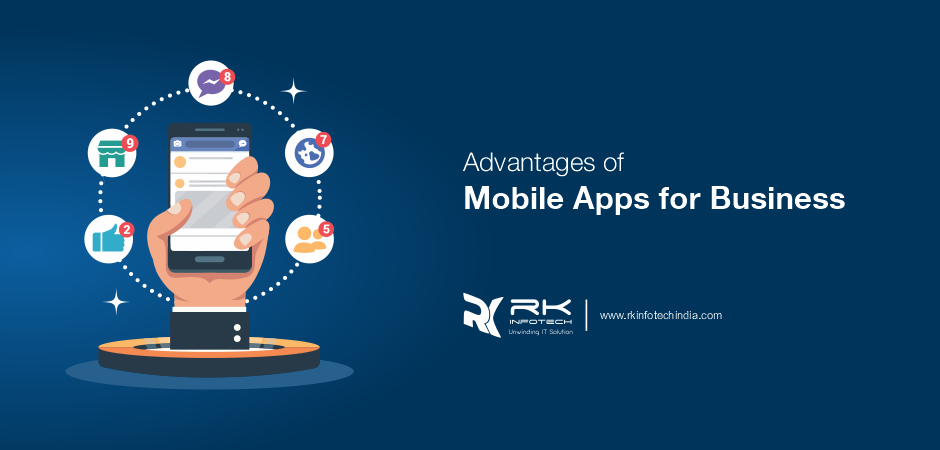Advantages of Mobile Apps for Business
Introduction
Are you thinking about how to grow your business? Mobile apps can benefit your business in many ways! These days even the smallest local businesses are represented online. This is understandable, as the Internet offers nearly limitless advertising opportunities. A website is almost essential for any kind of modern entrepreneur, but a mobile app offers benefits on a much higher level for business owners and customers alike. Let’s take a look at how mobile apps can open new business horizons in the digital age.

14 Reasons Businesses Need Mobile Apps:
People are addicted to their smartphones. No other type of portable device has achieved such popularity. That’s why many businesses are seizing the opportunity to reach potential and existing customers by building mobile apps. The benefits outlined below will help convince businesses to realize the importance of mobile apps and invest in developing apps for the enterprise. The list of positive effects is quite large and should be broken down for better understanding.
All of the features listed will ultimately benefit the company but are aimed at two groups: business managers and customers.
Mobile App Benefits for Business Management
Companies that have invested in their mobile applications can take full advantage of some very good benefits. These benefits help you gain a competitive edge in the marketplace, making your business more productive and agile. In a highly competitive market, you must seize every opportunity to stay ahead of the competition. High-quality mobile applications will provide many such opportunities.
1. Reaching out to larger audiences.
This is because people spend most of their day with their smartphones in their hands. This means people can access your service or product from virtually anywhere. More importantly, customers can easily place orders using the mobile app whenever they feel like it or when they feel like it. If your business has a mobile app, in some cases you won’t even need to open an “offline” office to handle a new destination. Expanding your business into new territories is usually easier and more profitable by working with a reliable delivery company. Increased reach translates to increased sales and increased revenue.
2. Sales Optimization.
The mobile app makes it easy for a sales manager or consultant to contact a customer to confirm an order, set a delivery date, or provide useful information. For example, we developed an app for Harley-Davidson that helps convert trade show attendees into customers. It’s also an effective way to communicate information about new arrivals, new app features added in the latest update, and more. Typically, these mobile apps also offer a search function that allows shoppers to find the product they need without having to talk to a cashier.
3. Improved statistics collection.
Mobile operating systems offer a variety of methods for collecting information related to user interaction with the software. Personal data is useful for researching customer preferences, predicting future needs, and suggesting the best delivery method. For example, if someone buys a crib, your app can suggest the same or different crib products for that customer during the next interaction. Anonymized data is critical for business analytics to build and change management plans, marketing strategies, and more.
4. Easier progression.
You can leverage the potential of each smartphone to announce new products, services, discounts, and other offers even more effectively. Your software can use push notifications to provide users with less intrusive information than, for example, pop-ups on a website. Similar functionality was implemented in an individual solution for a large clothing store chain. Another mobile app business opportunity is the ability to promote services or engage customers with in-app offers powered by analytics algorithms.
5. Availability 24/7.
Unlike offline shops or offices with fixed work schedules, mobile applications are always available. This means you can view and order a company’s services or products. So if your physical store closes, you won’t lose customers. Even when an employee is away, the app can use specially trained chatbots to communicate with customers and relay information to the appropriate department.
6. Better Images.
A company-branded mobile application is a milestone in business development. When a startup launches a mobile software product, it claims to have both the means and the tenacity to expand its presence in the market. Creating and maintaining mobile applications requires a well-planned budget and a well-planned business strategy. That is what strengthens your reputation and makes your position more powerful among your rivals.
7. Enhanced security.
Websites are notoriously vulnerable to hacking and DDoS attacks. Mobile apps undergo additional review by Google and Apple before appearing in their respective app stores. In this way, business operations and customer interactions are better protected from malicious botnets, viruses, or other digital threats. Smartphones also have built-in security features such as facial recognition and fingerprint authentication. With these features, customers will feel more secure when using the mobile app, potentially spending more time and placing more orders.
Benefits of Mobile Apps for Customers
Mobile software will also help your company by providing many positive benefits to your customers. This will increase customer satisfaction and increase loyalty and trust in your brand. Customers will love a user-friendly application that works quickly and has a user-friendly interface. Their positive impression of the application will be reflected in the image of the brand as a whole. Simply put, a good mobile app will make users love you more.
8. Save time.
Mobile applications provide convenient and quick access to products, services, and customer support from your smartphone or tablet. For example, instead of browsing warehouse shelves for hours, users can browse the entire inventory in minutes. Similarly, if you have a car rental business, your customers can use the app to easily check the full car selection available.
9. Convenience and new experiences.
Mobile apps are designed to provide a unique customer experience using smartphone hardware. For example, with the help of cameras and augmented reality technology, users can virtually try on clothes. It’s hard to overestimate the potential benefits of digital technology delivered by the combination of modern equipment and mobile applications for businesses, regardless of industry.
10. Delivery monitoring.
Customers can use their smartphones to check the status of their orders while they are being processed and shipped. This gives users a sense of control and confidence that they get what they want when they want it. The app can schedule a push notification to appear on the device screen on the day of delivery.
11. Easy access to loyalty programs.
Eligible customers can log in to the mobile app to view and redeem their loyalty benefits. These perks include rewards, bonuses, discounts, and other tactics to build long-term customers. For example, an application can automatically recalculate prices and apply discounts received by specific customers using mobile devices.
12. Personalization.
The app may use data analysis and targeting algorithms to increase customer engagement by providing personalized deals and offers. This gives users confidence that the company cares about their needs and is somewhat predictable. According to a Google study, 58% of mobile users prefer to have corporate apps “remember” them. The software can also have multiple color schemes to suit each user’s taste.
13. Minimize offline interactions.
Many people dislike in-store shopping because they associate it with long lines, crowds, noise, and boring mate waiting. Mobile apps can be a blessing for introverts or those who don’t like to interact with people. This benefit has proven significant during the COVID pandemic. The use of mobile apps has enabled many businesses to continue operating while minimizing face-to-face contact.
14. Ability to give and receive feedback.
Mobile business app users can view comments and responses from other customers. The software can automatically display verified customer responses and hide messages from unverified users. Therefore, both positive and negative feedback can only be given by real customers. This action prevents spam attacks when fake users try to leave numerous negative comments about your service or product.
Conclusion
As you can see, the benefits of mobile business applications are many and undeniable. It can create engaging user experiences, increase brand loyalty, and make your company more recognizable and credible, as well as many other benefits. Mobile applications allow your business to attract more customers and respond more accurately and sensitively to customer needs.
However, these positive effects include certain costs and reserves. To make informed decisions, you need to be aware of how mobile applications can negatively impact your business processes. Poor-quality mobile apps can prevent customers from using your app. For example, if your mobile app can’t add an item to their shopping cart, your customer won’t be able to make a purchase. And this is just one example of the many cases where things can go wrong.
That’s why you need a highly qualified team to develop, test, launch, and support your mobile software.
Contact us to unlock the full business benefits of custom mobile applications. RK Infotech will provide you with an optimal software solution designed specifically for your needs.








